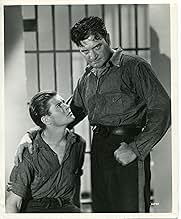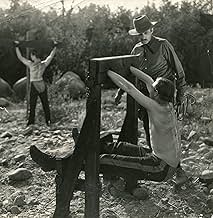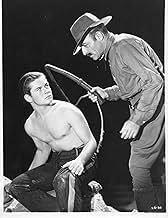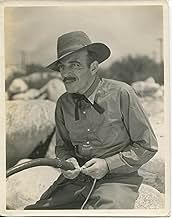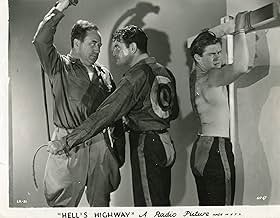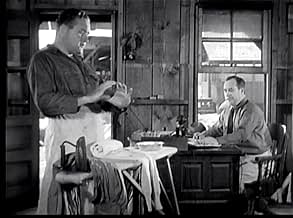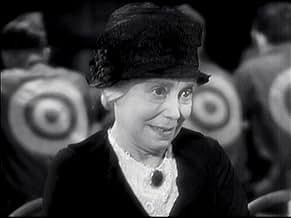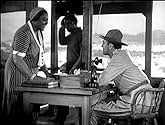Ajouter une intrigue dans votre langueChain gang prisoners forced to construct a "liberty highway" for their overseer chasten under his brutal stewardship, causing Duke Ellis to mastermind a mass riot.Chain gang prisoners forced to construct a "liberty highway" for their overseer chasten under his brutal stewardship, causing Duke Ellis to mastermind a mass riot.Chain gang prisoners forced to construct a "liberty highway" for their overseer chasten under his brutal stewardship, causing Duke Ellis to mastermind a mass riot.
- Réalisation
- Scénario
- Casting principal
- Récompenses
- 1 victoire au total
- Hunt Club Manager on Telephone
- (non crédité)
- Singer in Etude Ethiopian Chorus
- (non crédité)
- Singers of the Spirituals
- (non crédité)
- Turkey Neck Burgess - the Cook
- (non crédité)
Avis à la une
The film stars Richard Dix in an unusual role. He plays perhaps the toughest of all these prisoners--a guy respected yet feared by everyone. Only when his young brother is also committed to this same chain gang is Dix's toughness challenged. Amidst this strange family reunion is the purpose of this chain gang--not to rehabilitate but to provide cheap labor for a jerk trying to produce a road and make himself rich in the process.
The film excels due to pretty good acting and an exciting script. While it's not as timeless and important as "I Am a Fugitive...", it is, nonetheless, well worth seeing and might surprise you at the film's quality and strength.
sign language gibberish
Catch those rolling cages the convicts are kept in. They'd even be sub-standard for wild animals in a circus. But then, this is a down and dirty look at a chain-gang work crew, circa 1932, where shooting a con is made easier by the bull's eye on their backs. And if a con misbehaves, like not working fast enough to make the road contractor more money, it's a time in the sweat box, which is like doing time in an upright coffin-- you walk in, they carry you out. Now all this might sound like a lefty screenwriter's fevered dream, but the prologue assures us that the abuses are based on fact.
Then too, the cons are toiling in the middle of one ugly nowhere, and when the place catches fire, it's big enough to take down Chicago. No wonder the cons are looking to escape, and being a prison movie, they do. In my book, the best scene is the luckless deaf guy who never hears the bullet coming. I hope his last minute mumbo-jumbo was enough to get him past the pearly gates—it's a moving and inspired moment.
Then too, Dix makes a convincing boss con, as does C. Henry Gordon as the brutal boss muleskinner. But my money's on the cadaverous Charles Middleton (the hermit) who's on prison vacation from three wives and apparently dabbles in the black arts as when he foresees doom in the stars. His graveyard voice and grim reaper demeanor are like no other and can chill you to the proverbial bone.
Of course, being a Rowland Brown directed film, there are passing references to homo-erotic behavior, (see especially his Blood Money {1933}). All in all, he manages to blend the diverse story elements, including the black men's chorus, into a forcefully memorable whole. Too bad his directing career was so brief. He was that rarest bird in old Hollywood—a genuinely independent spirit.
It's a bang-up 60-minutes from struggling little RKO that takes no prisoners, so to speak. More importantly, there's something topical about tax-supported labor being used to enrich private contractors, as in the movie. Too bad, this over-looked little gem was assigned to pre-Code oblivion.
Hard hitting & gritty, this neglected little drama is fascinating in its detailed portrayal of a tough subject. Road gang prisoners were still being systematically abused in 1932 and this film helped to shine a light into some very dirty corners, while at the same time delivering a compelling human interest story.
Richard Dix gives a typically fine performance as Duke Ellis, a bad guy with a good heart. He's able to dominate the other prisoners until his kid brother (very well played by Tom Brown) reveals his soft spot. Dix was a strong, virile actor who survived the transition from Silents to Talkies in good form and easily projected a persona of raw intensity. It is a shame that he is nearly forgotten today.
Although she receives third place billing, lovely Rochelle Hudson, as young Brown's girlfriend, has very little to do in her only scene. Of much more interest is elderly Louise Carter, as the distraught mother of Dix & Brown. In her few moments of screen time she delivers a terrific performance of a good woman barely holding on to her emotional balance. Her participation in the film alone would make it worth watching.
A handful of character actors also add to the movie's distinction: beefy Stanley Fields as a sympathetic prison officer; Charles Middleton as a mystic, other-worldly prisoner; C. Henry Gordon as the sadistic violin playing warden; Sandy Roth as a violent, nearly blind, prisoner; and Warner Richmond as a guard who fears he may also be a cuckold.
Clarence Muse & Fuzzy Knight have small roles as prisoners. Movie mavens will spot an uncredited Louise Beavers as Muse's visiting sweetheart.
An intriguing aspect of the film is how the black prisoners are used as a kind of Greek Chorus, their songs making ironic comment upon the action. Their 'Frankie and Johnny' parody sequence in particular is a quietly brilliant moment of film-making in how it encapsulates, in a very short time, a key plot twist.
Richard Dix and Tom Brown play the Ellis Brothers, a pair of convicts in a southern state prison of unknown name. Dix is a hardened convict, a lifer who's about to have it made official because he was convicted of his fourth offense and falls under the habitual criminal act.
Dix has a hero worshiping younger brother in Brown who gets himself tossed in the slam because he decides to even the score for Dix by shooting someone who ratted his brother out. Dumb kid, he's lucky he missed otherwise it would be a very long stretch.
As in I Am a Fugitive From a Chang Gang the emphasis is on the horrible conditions in these prisons, they are every bit as gruesome as they are in the Warner Brothers film. The highlight of the film is a mass escape when the entire compound goes up in a kerosene fire. Even though these guys are in there for God knows what, your sympathies are with them as the local populace goes on a hunting expedition for the convicts. It's like everyone participating in Leslie Banks's sport of hunting The Most Dangerous Game which also came out that year by RKO.
I was pleasantly surprised by the depths of Richard Dix's performance. Usually he's a pretty straight arrow hero in his film in a classic Victorian era style of acting. His part here is the best work I've ever seen him do, though I can honestly say I haven't seen that many of his films.
You'll see good performances also by Stanley Fields as the head guard and by Charles Middleton, the philosophical bigamist in the joint for the same.
Catch this film if it is ever run again by TCM.
Le saviez-vous
- AnecdotesRKO executives were concerned about a possible plagiarism suit by the author of the book and the movie version Je suis un évadé (1932) in production at Warner Bros. at the time. Some deletions and changes were made until they were satisfied that no legal action would be taken.
- Citations
Duke Ellis: [Chatting with a convicted bigamist] How many women did you really marry?
Matthew the Hermit: How many banks did you really rob?
Duke Ellis: Never more than one at the same time.
Matthew the Hermit: It takes nerves of steel to rob a bank.
Duke Ellis: It takes a lot of backbone to keep three wives happy.
Matthew the Hermit: Yea, Brother!
Meilleurs choix
- How long is Hell's Highway?Alimenté par Alexa
Détails
- Date de sortie
- Pays d’origine
- Langues
- Aussi connu sous le nom de
- Hell's Highway
- Lieux de tournage
- Société de production
- Voir plus de crédits d'entreprise sur IMDbPro
- Durée1 heure 2 minutes
- Couleur
- Rapport de forme
- 1.37 : 1
Contribuer à cette page


